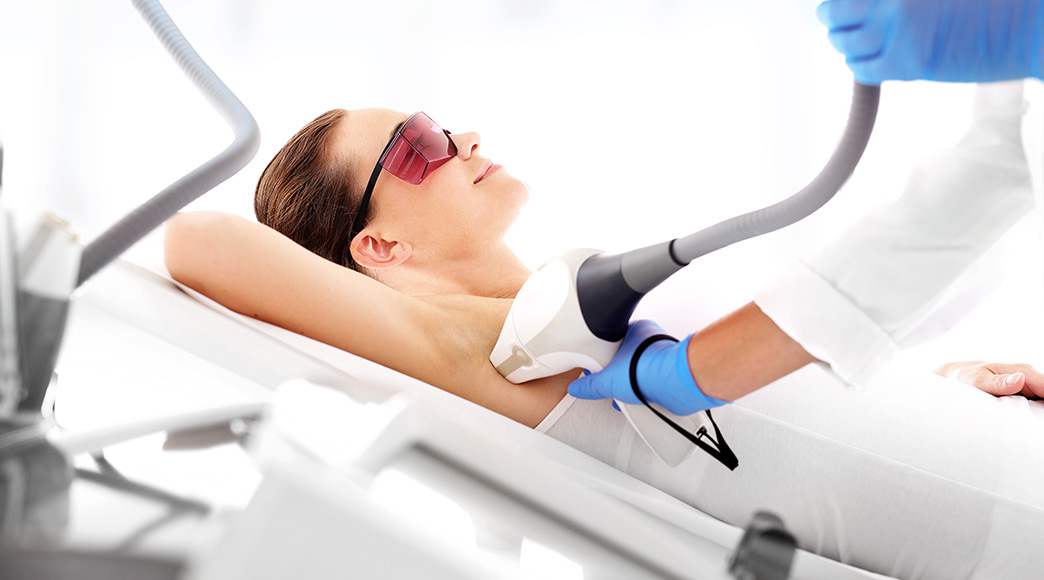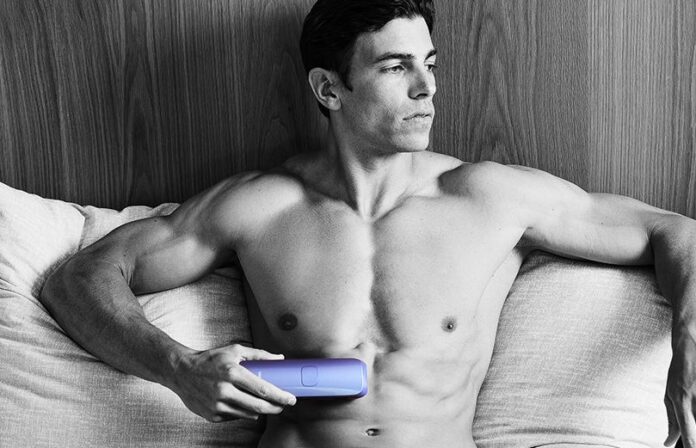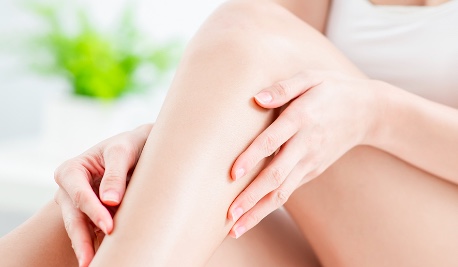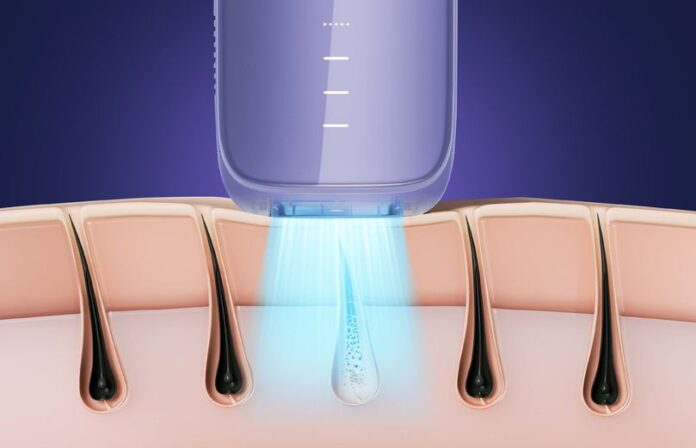Light-based hair removal is a popular and effective way to get rid of unwanted hair on various body parts. However, not all light-based methods are the same. In this article, we will compare two of the most common types of light-based hair removal: laser and intense pulsed light (IPL).
How Does Light-Based Hair Removal Work?
Both laser and IPL hair removal systems rely on the principle of selective photothermolysis. These systems produce light that is selectively absorbed by a chromophore—in this case, the melanin located within the hair bulb and hair shaft.1
The absorbed light causes thermodynamic heating of the hair follicle without any damage to the surrounding tissues.2 At first, the temperature is increased in the melanin-containing hair matrix and hair shaft keratinocytes, followed by dermal papilla fibroblasts, keratinocytes in the inner and out root sheath, and epithelial stem cells of the hair follicle bulge.3 The temperature rise is determined by the parameters of light, such as wavelength or wavelength range, fluence, as well as the thickness of the hair, hair color, depth in the skin, hair density, and more.3
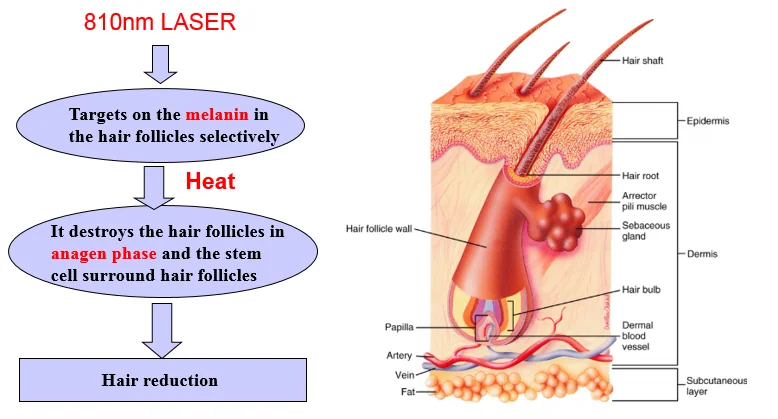
The thermodynamic heating leads to chemical denaturation of cellular proteins and phospholipid membranes causing irreversible damage to hair follicles, or modification of the signaling pathways that control hair growth cycles.3
Laser devices produce a coherent light of a specific color, while IPL devices use a broad-spectrum light comprised of different light colors. Different lasers emit light of various wavelengths (694 nm of Ruby laser to 1064 nm neodymium:yttrium-aluminum-garnet (Nd:YAG) laser), compared with 590–1,200 nm produced by IPL devices.1
How to Use IPL and Laser Devices?
Laser devices are most often used by trained professionals in specialized clinics. However, IPL devices can be used at home without any prior training.
Before using both, a patch test should be done to test for side effects such as skin irritation, redness, pain, or damage. A post-marketing surveillance study evaluating adverse events associated with a home-use IPL device found skin pain, thermal burns, and erythema to be the most common side effects.4 The IPL device should be used in low-intensity mode on a small portion of the skin about 24 hours before the actual hair removal treatment.
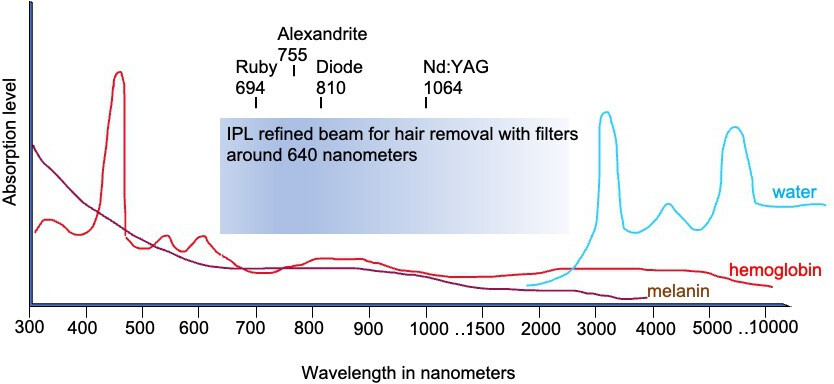
Before the treatment, the hairs should be shaved or removed from the treatment area by a method that does not affect the roots. To start the hair removal process, the device should be gently placed on each portion of the skin. IPL devices typically target a larger area than laser devices, allowing for a larger amount of hair to be treated simultaneously.2 The intensity level should be adjusted to skin sensitivity. Ulike Sapphire Air 10 and Ulike Sapphire Air 3 come with special modes for different body parts.
It is important to wear goggles or other protective eyewear during the light procedure. A systematic review identified cases of eye damage including atrophy of the iris, inflammation of the anterior eye chamber, and damage of the retinal pigment epithelium following exposure to office IPL or Diode lights.5
Light-based hair removal procedures require multiple sessions. The success of any procedure is determined by the growth cycle of hair follicles comprised of three distinct phases: growth (anagen), regression (catagen), and rest (telogen).1 As the ratio of these phases differs, so do the growth rates of hairs at different body sites. Since lasers and IPL produce light of various wavelengths and hair follicles may be affected at different growth cycle phases, multiple sessions are needed when using laser and IPL devices.
How Painful is the Hair Removal Procedure?
Hair follicles are complex, hormonally active structures that can be equipped with over 2000 sensory endings.6 These myelinated and unmyelinated afferent fibers can transmit painful sensations, including both acute pain and post-treatment discomfort.
Heat increase in the hair follicle may cause mild to severe pain, sometimes described as a “hot pinprick” or “an elastic band snapping against the skin.” Although very individual, the level of discomfort is determined by light wavelength, spot size, energy level, site of treatment, and age.6 Nd:YAG lasers have been associated with higher levels of pain and inflammation, while IPL devices cause the lowest intensity of pain.7
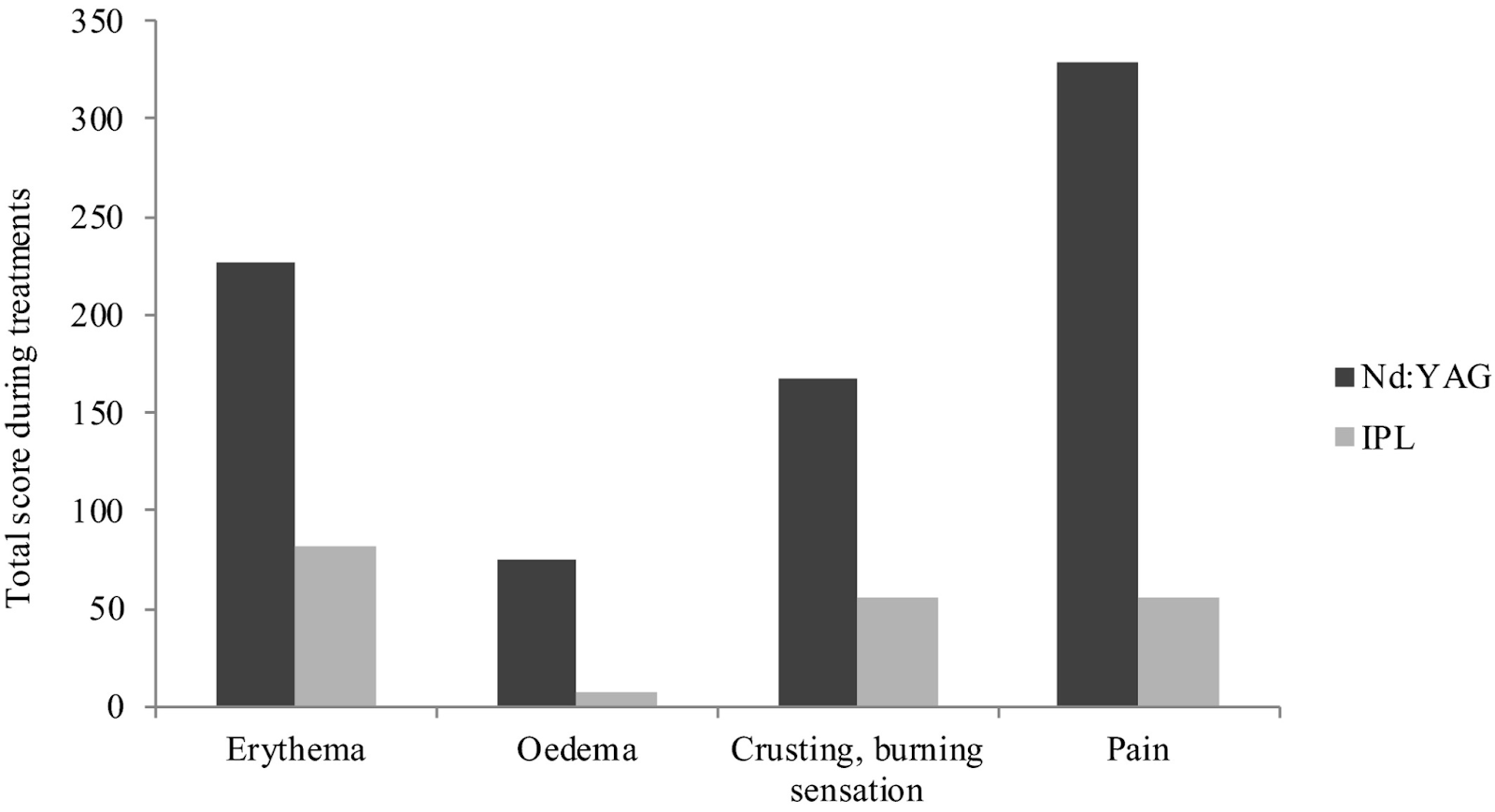
To counteract the heat-driven painful sensations, skin cooling can be done before, during, and after light-based hair removal treatment. Today, most hair removal devices have a built-in cooling system. A highly effective technique is based on the use of conductive materials, such as sapphire.6
Ulike’s patented Ice-Cooling System is the most effective cooling technology for IPL devices on the market. It increases user comfort and treatment efficiency while minimizing the occurrence of adverse events.
The Ulike Sapphire Air 3 comes with cooling technology that limits the temperature to only 18.2℃ after 30 minutes of use, while Ulike Sapphire Air 10 features next-generation Sapphire Cooling Technology that reduces the temperature to 15.6℃ after 30 minutes of use.
How Effective is IPL vs Laser Hair Removal?
The effectiveness of IPL and laser hair removal has been evaluated in various studies and results have not always been consistent.
In a study with 6 and 18-month follow-up, both IPL and laser devices safely and efficiently decreased unwanted leg hair. However, the IPL method was associated with a lower rate of side effects and higher satisfaction scores.2
Another study compared the effectiveness, consumer satisfaction, safety, and side effects of Nd: YAG versus IPL. The results showed no significant difference between the numbers of hair follicles with the two light hair removal methods.7
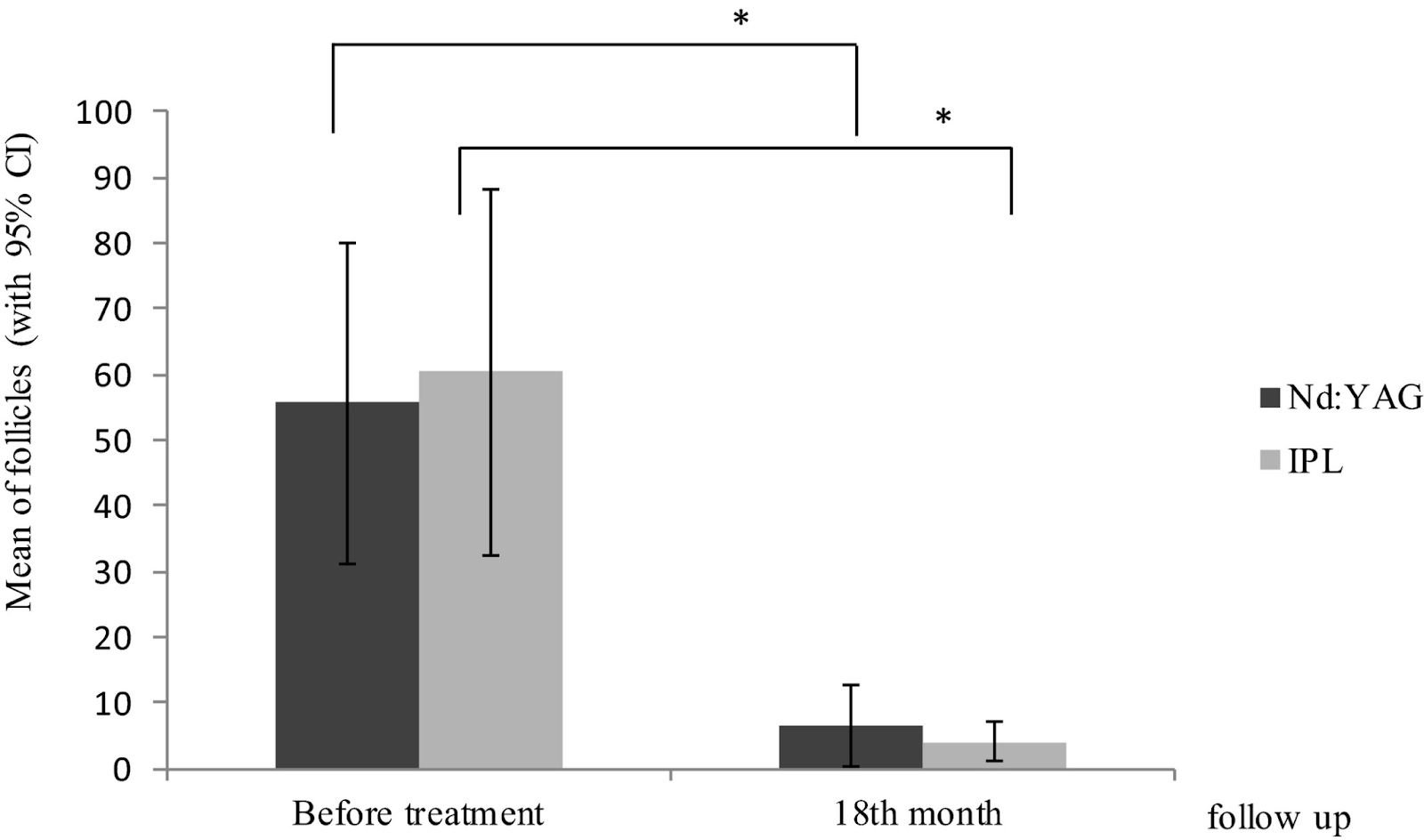
In another non-randomized study evaluating the utility of home-use IPL devices on the axilla, bikini area, abdomen, neck, chin, and upper lip regions, the mean hair reduction was 47% at 4 weeks follow-up and 41% at 6 months follow-up.8
Ulike IPL devices have yielded higher efficacy results compared with other devices tested. Ulike Sapphire Air 10 provides 96% hair density reduction in 2 weeks, as well as visible hair reduction in 1 weeks. It features 4 flashes per second which allows for a full body treatment in only 8 minutes.
Ulike Sapphire Air 3 yields 93% hair density reduction in 4 weeks and visible hair reduction in 2 weeks. It features 1.4 flashes per second which allows for a full body treatment in only 12 minutes.
How Many Sessions Are Needed?
Consistency is key when it comes to IPL and laser hair removal. Multiple sessions are necessary to tackle the hairs in different stages of the hair growth cycle.
In general, laser hair removal requires four to six sessions that are performed one month apart. It usually takes between three and six months for consumers to notice a meaningful difference in hair growth.
IPL hair removal requires more sessions: from six to twelve, with a frequency of two to three weekly sessions. Most people notice a difference after 12 weeks of IPL device use, with a significant reduction in the density and thickness of hairs after each session.
References
- Krasniqi A, McClurg DP, Gillespie KJ, Rajpara S. Efficacy of lasers and light sources in long-term hair reduction: a systematic review. J Cosmet Laser Ther. 2022 Jul 4;24(1-5):1-8. doi:10.1080/14764172.2022.2075899
- Mandy M. Thomas & Nicolette N. Houreld (2019): The “in’s and outs” of laser hair removal: a mini review. Journal of Cosmetic and Laser Therapy. doi:10.1080/14764172.2019.1605449
- Town G, Botchkareva NV, Uzunbajakava NE, Nuijs T, van Vlimmeren M, Ash C, Dierickx C. Light-based home-use devices for hair removal: Why do they work and how effective they are? Lasers Surg Med. 2019 Aug;51(6):481-490. doi:10.1002/lsm.23061
- Hattersley AM, Kiernan M, Goldberg D, Dierickx C, Sliney DH, Haedersdal M, Nash JF. Assessment of adverse events for a home-use intense pulsed light hair removal device using postmarketing surveillance. Lasers Surg Med. 2023 Apr;55(4):414-422. doi:10.1002/lsm.23650
- Al Muqarrab FJ, Alsuwaidan S, Al Muqarrab Z, Alajlan A. Is It Possible for Light-Based Hair Removal Home Devices to Induce Ocular Damage? Systematic Review. Clin Cosmet Investig Dermatol. 2023 Dec 23;16:3731-3742. doi:10.2147/CCID.S442963
- Aimonetti JM, Ribot-Ciscar E. Pain management in photoepilation. J Cosmet Dermatol. 2016 Jun;15(2):194-9. doi:10.1111/jocd.12196
- Szima GZ, Janka EA, Kovács A, Bortély B, Bodnár E, Sawhney I, Szabó É, Remenyik É. Comparison of hair removal efficacy and side effect of neodymium:Yttrium-aluminum-garnet laser and intense pulsed light systems (18-month follow-up). J Cosmet Dermatol. 2017 Jun;16(2):193-198. doi:10.1111/jocd.12312
- Emerson R, Town G. Hair removal with a novel, low fluence, home-use intense pulsed light device. J Cosmet Laser Ther. 2009 Jun;11(2):98-105. doi:10.1080/14764170902792199

 By Samuel Sarmiento
By Samuel Sarmiento
